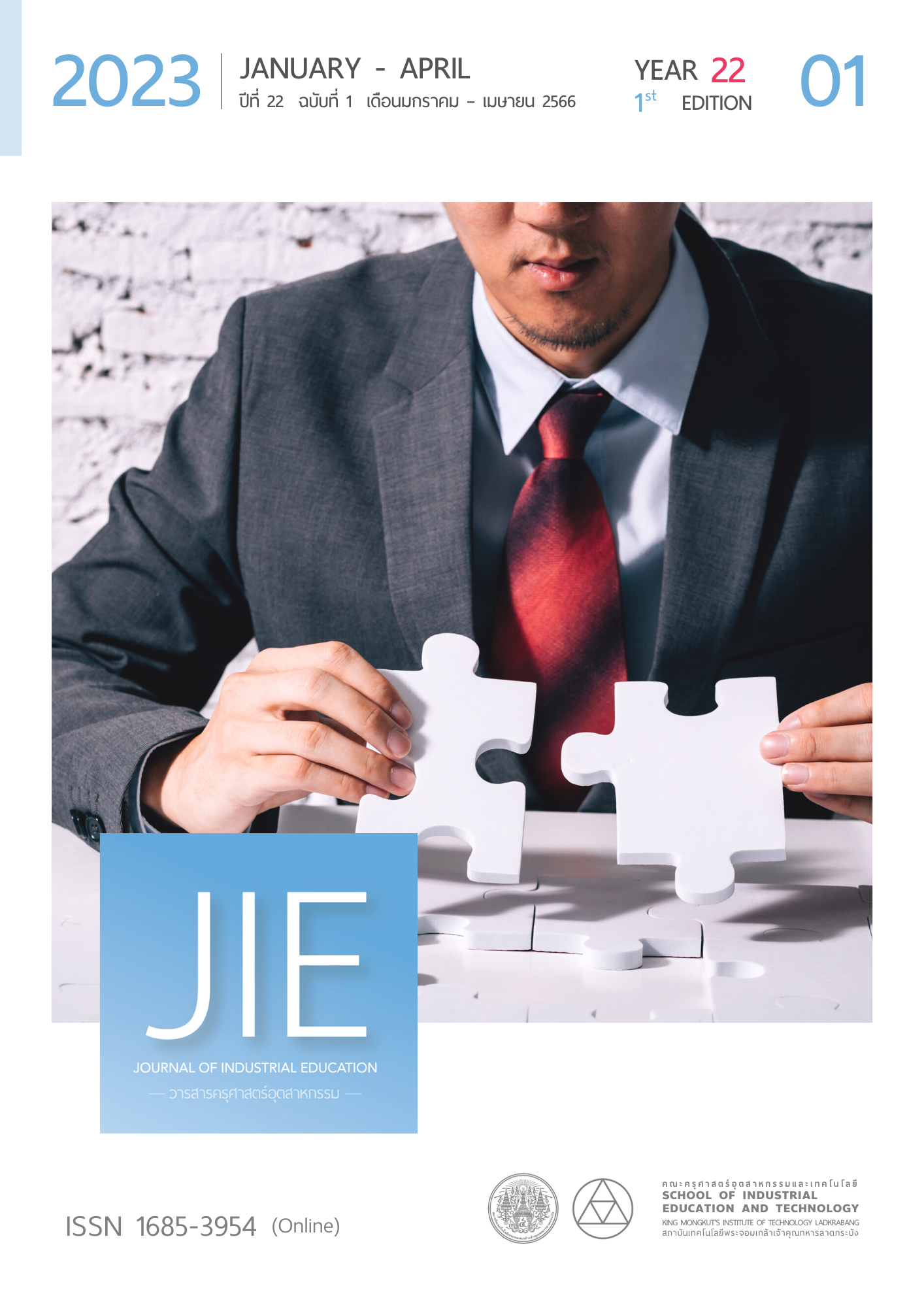THE IMAGINEERING LEARNING OF TECHNOLOGY MODEL WITH METAVERSE STORYTELLING TO ENHANCE ENGINEERING DESIGN SKILLS
Keywords:
Imagineering learning of technology, Metaverse storytelling, Digital media, Engineering design skillsAbstract
The imagineering learning of technology model with metaverse storytelling is a model that can be employed to promote limitless self-learning by means of active learning, which encourages learners to the creation of new bodies of knowledge to enhance engineering design skills. This model can also be applied in other contexts, which can be done by integrating the concepts of technologies and new platforms of instruction to create new concepts of instruction designs. Not only that, the model can be utilized in the new normal instruction management that usually focuses on continuous learning, which can be conducted anywhere and anytime, with the aid of technology. The sample group is five experts in design and development of teaching and learning models from various institutions in higher education based on purposive sampling. The data collecting tools are 1) the imagineering learning of technology model with metaverse storytelling, 2) the imagineering learning of technology process with metaverse storytelling, 3) the suitability assessment form of the imagineering learning of technology model with metaverse storytelling, and 4) the suitability assessment form of the imagineering learning of technology process with metaverse storytelling. The statistics utilized for data analysis were mean and standard deviation. According to the results, it is found that the imagineering learning of technology model with metaverse storytelling and the imagineering learning of technology process with metaverse storytelling were appropriate to enhance engineering design skills at the highest level, which is in compliance with the established research hypothesis.
References
Binance Academy. (2022). Top 7 Technologies that power the metaverse. https://academy.binance.com/en/articles/top-7-technologies-that-power-the-metaverse
Chanintarapum, A., Nillapan, M., Satimon, A., & PoNgern, W. (2021). The development of instructional model base on STEAM to enhance technological innovation creativity skills of secondary students. Journal of Research and Curriculum Development, 11(1), 118-131. (in Thai)
Chatwattana, P., & Nilsook, P. (2017). A web-based learning system using project-based learning and imagineering. International Journal of Emerging Technologies in Learning, 12(5), 4-22.
Chujitarom, W., & Wannapiroon, P. (2018). Development of STEAM digital storytelling model to create digital economy innovation for art education. The International Journal of Design Education, 12(4), 55-62.
Institute of Academic Development. (2020). Technology and engineering design process. Institute of Academic Development. (in Thai)
Kanasutra, P. (1995). Statistics for research in the behavioral sciences. Chulalongkorn University Press. (in Thai)
Khamanee, T. (2016). Pedagogical sciences: Knowledge for organizing effective learning processes (20th ed.). Chulalongkorn University Printing House. (in Thai)
Kummanee, J., Nilsook, P., & Wannapiroon, P. (2020). Digital learning ecosystem involving steam gamification for a vocational innovator. International Journal of Information and Education Technology, 10(7), 533-539.
Ministry of Education. (2017). The Preparing Students for Work in the 21st Century. https://www.moe.go.th
Nilsook, P., Utakrit, N., & Clayden, J. (2014). Imagineering in education: A framework to enhance students' learning performance and creativity in thinking. Educational Technology, 54(1), 14-20.
Office of the Education Council. (2019). Guidelines for creating and promoting digital literacy for teachers. (Research Report). Bangkok: Office of the Education Council. (in Thai)
Petit, E. (2020). Digital storytelling for developing students’ agency through the process of design: A case study. In B. Dupuy and M. Grosbois (Eds.), Language learning and professionalization in higher education: pathways to preparing learners and teachers in/for the 21st century (pp. 137-166). Research-publishing.net. https://doi.org/10.14705/rpnet.2020.44.1104
Songkram, N. (2011). Creating digital video and digital storytelling for instruction in the digital age. Chulalongkorn University Press. (in Thai)
Suzuki, S., Kanematsu, H., Barry, D.M., Ogawa, N., Yajima, K., Nakahira, K.T., Shirai, T., Kawaguchi, M., Kobayashi, T., & Yoshitake, M. (2020). Virtual experiments in metaverse and their applications to collaborative projects: The framework and its significance. Procedia Computer Science, 176, 2125-2132.
Wattanasin, W., Chatwattana, P., & Piriyasurawong, P. (2021). Engineering project-based learning using a virtual laboratory and mixed reality to enhance engineering and innovation skills. World Transactions on Engineering and Technology Education, 19(2), 232-237.
Wongyai, W., & Patphol, M. (2019). Digital learning. Innovative Leaders Center of Curriculum and Learning. (in Thai)
Downloads
Published
How to Cite
Issue
Section
License
Copyright (c) 2023 Journal of Industrial Education

This work is licensed under a Creative Commons Attribution-NonCommercial-NoDerivatives 4.0 International License.
"The opinions and contents including the words in papers are responsibility by the authors."
"ข้อคิดเห็น เนื้อหา รวมทั้งการใช้ภาษาในบทความถือเป็นความรับผิดชอบของผู้เขียน"



